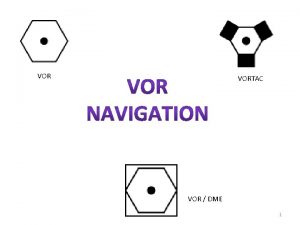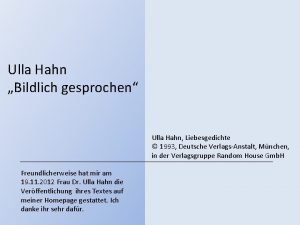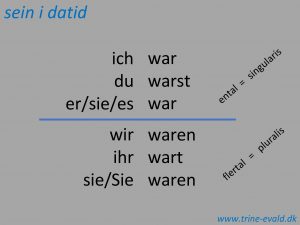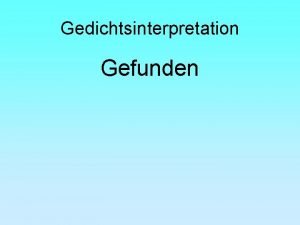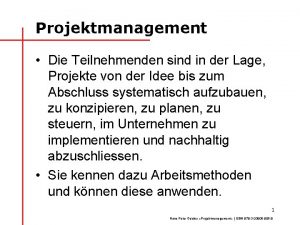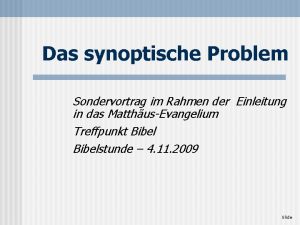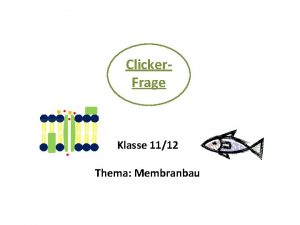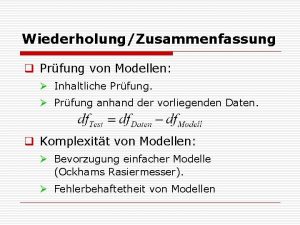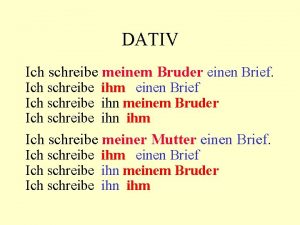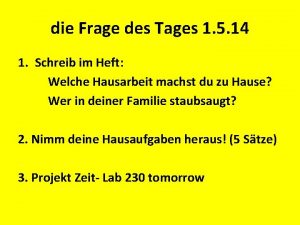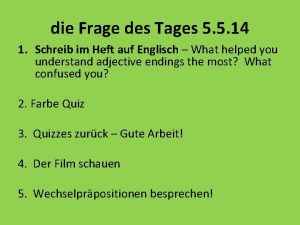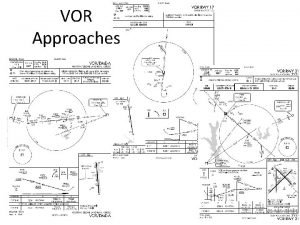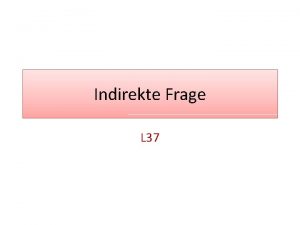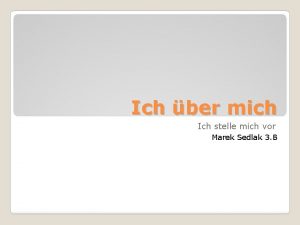Frage des Tages Vor meinem Prfung war ich














- Slides: 14


Frage des Tages • Vor meinem Prüfung war ich sehr _____. a) aufgeregt b) aufregend

Objective • Students will be able to use the plusquam perfekt form to create complete sentences. Students will be able to read and discuss the Nürenberg reading.

Order of Events • Plusquam perfekt • Nürenberg reading

The Past Perfect Tense in English: • The past perfect tense describes events or situations that precede another point in the past that has been established through the present perfect or the simple past. • English creates this tense with a past participle and, as the name suggests, with the auxiliary verb, "to have, " conjugated in its past-tense forms:

English • 1. I had already noticed that before you called my attention to it. • She was tired because she hadn’t slept the night before. • He had been living in his car for several months before finally finding an apartment.

The Past Perfect Tense (das Plusquamperfekt) in German: • In German, as in English, the past perfect describes a time previous to another in the past. It is constructed just like the present perfect tense, except that the auxiliary "haben" or "sein" is in its simple past form: "hatte" or "war. " • The "Plusquamperfekt" is always used when you speak about an event in the past that had happened before another event in the past. Another expresson for the "Plusquamperfekt" is "Vorvergangenheit" (="pre past") which describes its purpose best.

Plusquamperfekt Conjugation of haben • ich hatte gehabt du hattest gehabt er hatte gehabt wir hatten gehabt ihr hattet gehabt sie hatten gehabt

Plusquamperfekt conjucation of sein • ich war gewesen du warst gewesen er war gewesen wir waren gewesen ihr wart gewesen sie waren gewesen

• Example 1: • Als die Eltern das Haus verlassen hatten, schauten die Kinder die ganze Nacht fern. (When the parents had left the house the children watched tv all night. ) • event 1: the parents left the house • event 2: the children watched tv • both events happened in the past • for event 1 you always use "Plusquamperfekt" and for event 2 "Präteritum" or "Perfekt"

1. Sie hatte gut gespielt, bis sie verletzt wurde. 1. Er war schon einen Monat in Berlin gewesen, bevor er in die Oper gegangen ist. She had played well until she was injured. He had already been in Berlin for a month before he went to the opera.

1. Ich hatte Chinesisch schon als Kind gesprochen, aber jetzt wollte ich Deutsch lernen. I had already spoken Chinese as a child, but now I wanted to learn German. 1. Wir hatten nichts davon gewusst, bis sie endlich alles erklärte. We hadn't known anything about it until she finally explained everything.

• There a row of conjuctions which are clear indicators for "Plusquamperfekt" : • nachdem (=after) • als (=when) • bevor (=before)

• Examples: • Nachdem ich die Prüfung bestanden hatte, habe ich eine große Party gemacht. (After I had passed the exam I made a big party. ) • Als wir zur Party kamen, waren die meisten Leute schon gegangen. (When we arrived at the party most people had gone already. ) • Bevor ich Cathy kennen lernte, hatte ich mich noch nie intensiv mit der deutschen Grammatik beschäftigt. (Bevore I met Cathy I hadn't never dealt intensively with the German grammar. )
 Ablauf des tages
Ablauf des tages Ich freue mich wenn ich dich seh ich finde dich so nett
Ich freue mich wenn ich dich seh ich finde dich so nett Far91.205
Far91.205 Ulla hahn bildlich gesprochen interpretation
Ulla hahn bildlich gesprochen interpretation Ich war du warst er war
Ich war du warst er war Ich war du warst er sie es war
Ich war du warst er sie es war Licht dieser welt ich will dich anbeten
Licht dieser welt ich will dich anbeten Gefunden gedicht goethe
Gefunden gedicht goethe Expanded noun phrase
Expanded noun phrase Eines tages wird alles gut sein das ist unsere hoffnung
Eines tages wird alles gut sein das ist unsere hoffnung Des des des
Des des des Gottesleugner 7 buchstaben
Gottesleugner 7 buchstaben Gute frage
Gute frage Logienquelle
Logienquelle Frage 1112
Frage 1112


